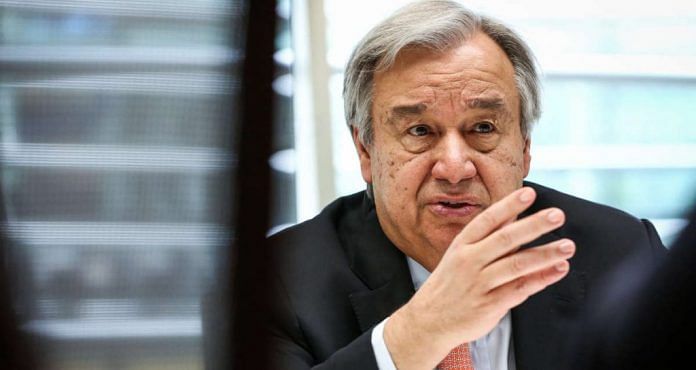
United Nations: The countries of Central and South Asia can only fully benefit from potential opportunities if the region at large is at peace, UN Secretary-General Antonio Guterres has said, underlining that the promise of connectivity itself should become a counterbalance to the threat of further deterioration in war-torn Afghanistan.
Connectivity is central to trade, economic growth and sustainable development. But connectivity is not just about economics. It drives regional cooperation and encourages friendly relations among neighbours, near and far, Guterres said in a video message to the high-level International Conference on Central and South Asia: Regional Connectivity in Uzbekistan’s capital, Tashkent on Friday.
Enhanced connectivity that is environmentally sustainable and based on the rule of law can contribute to building long-term peace, stability and prosperity in Central and South Asia. This is crucial now more than ever, he said.
He said the countries of Central and South Asia can only fully benefit from potential opportunities if the region at large is at peace.
This places an even higher premium on the importance of active and collective engagement in support of Afghanistan’s peace and security. Guterres called on the nations to work together to ensure that the potential dividends of peace are well enough understood by all so that the promise of connectivity itself becomes a counterbalance to the threat of further deterioration in Afghanistan.
He stressed that the conference is an important step in that direction and the UN stands ready to support your efforts to strengthen interconnectedness in the region for the benefit of all.
His comments came as clashes between the Afghan government forces and the Taliban intensified since US troops began to withdraw from the country, ending nearly two-decade of its military presence in the war-ravaged country.
The Taliban, a fundamentalist Islamist militia, was evicted from power by the US-led forces in 2001 after the 9/11 terror attacks in the US.
The Taliban recently claimed their fighters had retaken 85 per cent of territory in Afghanistan – a figure disputed by the government in Kabul.
Subscribe to our channels on YouTube & Telegram
Why news media is in crisis & How you can fix it
India needs free, fair, non-hyphenated and questioning journalism even more as it faces multiple crises.
But the news media is in a crisis of its own. There have been brutal layoffs and pay-cuts. The best of journalism is shrinking, yielding to crude prime-time spectacle.
ThePrint has the finest young reporters, columnists and editors working for it. Sustaining journalism of this quality needs smart and thinking people like you to pay for it. Whether you live in India or overseas, you can do it here.